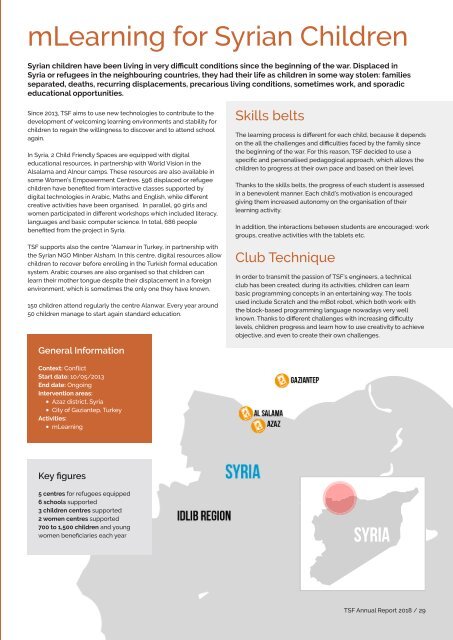Annual-Report-2018-test-Yumpu
You also want an ePaper? Increase the reach of your titles
YUMPU automatically turns print PDFs into web optimized ePapers that Google loves.
mLearning for Syrian Children<br />
Syrian children have been living in very difficult conditions since the beginning of the war. Displaced in<br />
Syria or refugees in the neighbouring countries, they had their life as children in some way stolen: families<br />
separated, deaths, recurring displacements, precarious living conditions, sometimes work, and sporadic<br />
educational opportunities.<br />
Since 2013, TSF aims to use new technologies to contribute to the<br />
development of welcoming learning environments and stability for<br />
children to regain the willingness to discover and to attend school<br />
again.<br />
In Syria, 2 Child Friendly Spaces are equipped with digital<br />
educational resources, in partnership with World Vision in the<br />
Alsalama and Alnour camps. These resources are also available in<br />
some Women’s Empowerment Centres. 596 displaced or refugee<br />
children have benefited from interactive classes supported by<br />
digital technologies in Arabic, Maths and English, while different<br />
creative activities have been organised. In parallel, 90 girls and<br />
women participated in different workshops which included literacy,<br />
languages and basic computer science. In total, 686 people<br />
benefited from the project in Syria.<br />
TSF supports also the centre “Alanwar in Turkey, in partnership with<br />
the Syrian NGO Minber Alsham. In this centre, digital resources allow<br />
children to recover before enrolling in the Turkish formal education<br />
system. Arabic courses are also organised so that children can<br />
learn their mother tongue despite their displacement in a foreign<br />
environment, which is sometimes the only one they have known.<br />
150 children attend regularly the centre Alanwar. Every year around<br />
50 children manage to start again standard education.<br />
Skills belts<br />
The learning process is different for each child, because it depends<br />
on the all the challenges and difficulties faced by the family since<br />
the beginning of the war. For this reason, TSF decided to use a<br />
specific and personalised pedagogical approach, which allows the<br />
children to progress at their own pace and based on their level.<br />
Thanks to the skills belts, the progress of each student is assessed<br />
in a benevolent manner. Each child’s motivation is encouraged<br />
giving them increased autonomy on the organisation of their<br />
learning activity.<br />
In addition, the interactions between students are encouraged: work<br />
groups, creative activities with the tablets etc.<br />
Club Technique<br />
In order to transmit the passion of TSF’s engineers, a technical<br />
club has been created; during its activities, children can learn<br />
basic programming concepts in an entertaining way. The tools<br />
used include Scratch and the mBot robot, which both work with<br />
the block-based programming language nowadays very well<br />
known. Thanks to different challenges with increasing difficulty<br />
levels, children progress and learn how to use creativity to achieve<br />
objective, and even to create their own challenges.<br />
General Information<br />
Context: Conflict<br />
Start date: 10/05/2013<br />
End date: Ongoing<br />
Intervention areas:<br />
• Azaz district, Syria<br />
• City of Gaziantep, Turkey<br />
Activities:<br />
• mLearning<br />
Key figures<br />
5 centres for refugees equipped<br />
6 schools supported<br />
3 children centres supported<br />
2 women centres supported<br />
700 to 1,500 children and young<br />
women beneficiaries each year<br />
SyriA<br />
TSF <strong>Annual</strong> <strong>Report</strong> <strong>2018</strong> / 29


